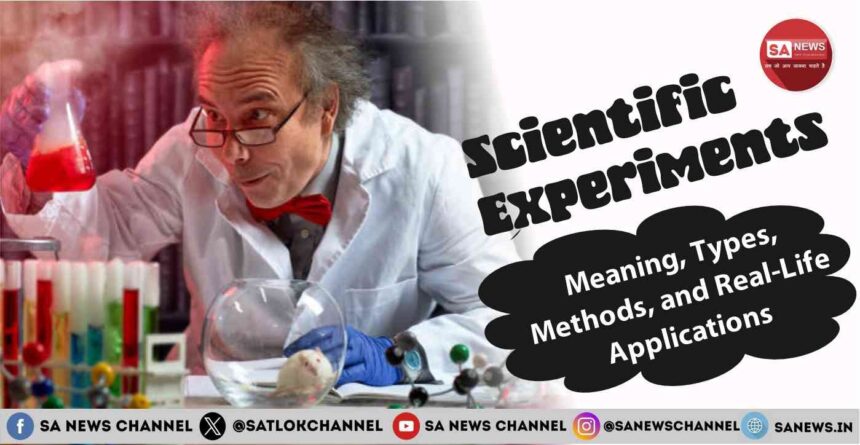Science is a strong tool that aids us in understanding the world. From curing diseases to building rockets, science has changed every part of human life. But how do scientists make discoveries? How do we know something is true or false?
- What Is a Scientific Experiment?
- Why Are Scientific Experiments Important?
- Discover New Knowledge
- Prove or Disprove Ideas (Hypotheses)
- Invent New Things and Improve Technology
- Cure Diseases and Save Lives
- Understand Nature and the Environment
- Solve Everyday Problems
- Support Education and Learning
- Remove Bias and Ensure Objectivity
- Steps of the Scientific Method
- 1. Ask a Clear, Testable Question
- 2. Conduct Background Research
- 3. Form a Hypothesis
- 4. Plan the Experiment Carefully
- 5. Perform the Experiment
- 6. Record and Analyze the Results
- 7. Draw a Conclusion
- Types of Scientific Experiments
- Variables in Experiments
- Tools Used in Scientific Experiments
- Ethics in Scientific Experiments
- Famous Scientific Experiments in History
- Modern Scientific Experiments
- School-Friendly Scientific Experiment Ideas
- Benefits of Doing Experiments in Education
- Real-Life Applications of Experiments
- Careers That Use Scientific Experiments
- Challenges in Scientific Experiments
- Tips for Successful Experiments
- Spiritual Knowledge of Saint Rampal Ji Maharaj Related to Scientific Experiments
- Conclusion
The answer is through scientific experiments.
Scientific experiments are the heart of science. They help us test ideas, find facts, and build knowledge. In this blog, we will explain what scientific experiments are, why they matter, the different types, how they are done, and many examples from both school and real life. Whether you’re a student, teacher, or just curious, this guide is for you.
What Is a Scientific Experiment?
A scientific experiment is a method used to test an idea (called a hypothesis) using careful steps. These steps help scientists understand if their idea is correct or not. Experiments use evidence — not opinions — to find the truth.
For example:
If a student wants to know whether plants grow better with sunlight or without, they can test it using two pots: one kept in sunlight and the other in darkness. The result will show which one grows better. This represents a simple type of scientific experiment.
Why Are Scientific Experiments Important?
Scientific experiments are the foundation of progress in every field of life. Without them, science would be just a collection of guesses and opinions. Experiments allow us to test ideas, observe results, and build knowledge based on facts. Let’s explore in more detail why scientific experiments are so important.
Discover New Knowledge
Experiments help us uncover truths about how the world works. Some of the greatest discoveries in history came from experiments:
- Gravity: Isaac Newton’s apple incident led to experiments with motion and force. These experiments helped us understand gravity and the laws of physics.
- Electricity: Benjamin Franklin’s kite experiment showed that lightning is a form of electricity. This knowledge eventually led to electric lights, power plants, and modern technology.
Key Point: Scientific experiments help turn questions into answers. They assist us in transitioning from “I think” to “I know.”
Prove or Disprove Ideas (Hypotheses)
In science, we don’t just believe something because it sounds right. We test it. This is what makes science different from myths or rumors.
For example:
If someone says, “Vitamin C prevents colds,” scientists will run controlled experiments with real people. If the data shows that people with extra Vitamin C do not get fewer colds, the idea is disproven.
If the data shows a benefit, then the idea is supported.
Key Point: Experiments help us separate facts from false beliefs.
Invent New Things and Improve Technology
Behind every invention is a set of experiments.
Take smartphones, for example:
- Engineers run thousands of tests on the screen, battery life, camera quality, and user safety.
- They experiment with materials like glass, plastic, and metals.
- Software developers test features again and again before releasing updates.
Other examples:
- Solar panels were created and improved through experiments with light, electricity, and materials.
- Electric cars were developed after years of testing batteries, motors, and energy systems.
Key Point: Scientific experiments turn ideas into real, useful inventions that improve life.
Cure Diseases and Save Lives
This may be the most powerful reason why scientific experiments are important. Every medicine we use today — from aspirin to cancer drugs — was tested in laboratories and clinical trials before being approved for people.
Also Read: The Frontier of Space Technology: Advancements and Impact
Example: COVID-19 Vaccine
- Scientists tested multiple vaccine candidates on animals first.
- Then they did double-blind trials on humans.
- Only after proving that a vaccine was safe and effective, was it made available to the public.
Other medical advances made possible by experiments include:
- Antibiotics
- Insulin for diabetes
- Chemotherapy for cancer
- Heart surgeries and organ transplants
Key Point: Scientific experiments in medicine help protect and extend human life.
Understand Nature and the Environment
Why do the seasons change?
What causes earthquakes?
How do animals survive in the desert?
These are questions scientists have answered through observation and experimentation.
For example:
- Weather patterns are studied using experiments and models based on temperature, air pressure, and ocean currents.
- Plant biology is understood by growing different species under various conditions.
- Pollution and climate change are tested using air and water samples and lab simulations.
Thanks to experiments:
- We know the ozone layer protects us from harmful sun rays.
- We understand how deforestation affects rainfall.
- We are finding new ways to reduce pollution using technology like biodegradable plastics and carbon capture.
Key Point: Experiments help us understand our planet and protect it for future generations.
Solve Everyday Problems
Scientific experiments aren’t just for big discoveries — they also solve small, everyday issues.
Examples:
- Which cleaning product removes stains best? → Run a test on dirty fabrics.
- What’s the best material to keep drinks hot? → Measure temperature loss in different cups.
- Can plants grow without soil? → Try hydroponic experiments at home.
Businesses, farmers, teachers, and even students use experiments to answer practical questions in daily life.
Key Point: Experiments give us better solutions in areas like cooking, farming, construction, education, and more.
Support Education and Learning
Experiments make science more than just reading from a book. When students do hands-on activities:
- They understand scientific ideas better.
- They remember concepts longer.
- They become curious and ask more questions.
- They learn skills like measurement, observation, teamwork, and critical thinking.
For example:
- A student might build a model volcano to learn about chemical reactions.
- Or test how much sugar dissolves in cold vs hot water to learn about solubility.
Key Point: Scientific experiments help students learn actively, not passively.
Remove Bias and Ensure Objectivity
Human opinions are often biased. We may believe something because of tradition, personal experience, or emotions. But science relies on evidence.
Experiments remove bias by:
- Using controls to compare results fairly
- Testing multiple times
- Having results reviewed by others
- Publishing data for the public to see
For example:
If a company claims its food is healthier, a scientific experiment can test the ingredients, calories, and nutrition — without emotion or opinion.
Key Point: Scientific experiments build trust because they are based on data, not belief.
Steps of the Scientific Method
The scientific method is a reliable way for scientists and researchers to investigate questions, solve problems, and discover facts. It involves a series of logical steps that help ensure that findings are based on clear evidence and not guesswork.
1. Ask a Clear, Testable Question
The question needs to be clear and able to be tested with experiments.
Example: Does the amount of sunlight affect how fast a plant grows?
2. Conduct Background Research
Look for information in:
- Science books
- Academic journals
- Online science databases
- School resources or previous experiments
3. Form a Hypothesis
A good hypothesis is written in an “If…then…” format.
Example: If a plant gets more sunlight, then it will grow taller.
4. Plan the Experiment Carefully
Identify variables:
- Independent Variable: What you change (e.g., sunlight)
- Dependent Variable: What you measure (e.g., height)
- Controlled Variables: What stays the same (e.g., type of plant, water)
5. Perform the Experiment
Follow the steps exactly. Make careful observations, measure accurately, and keep detailed notes.
6. Record and Analyze the Results
Use tools like:
- Tables
- Charts
- Graphs
Look for patterns, calculate averages, and compare groups.
7. Draw a Conclusion
Review your data. Summarize what you learned — even if your hypothesis was wrong.
8. Communicate the Results
Share findings through:
- Lab reports
- Presentations
- Graphs or posters
Types of Scientific Experiments
- Controlled Experiments – One variable is changed.
- Field Experiments – Conducted in natural settings.
- Natural Experiments – Observing naturally occurring events.
- Lab Experiments – Done under controlled lab conditions.
- Double-Blind Experiments – Used in medical trials to avoid bias.
Variables in Experiments
- Independent Variable: What you change
- Dependent Variable: What you measure
- Controlled Variables: What stays the same
Example: In testing which liquid helps a plant grow better:
- Independent: Type of liquid
- Dependent: Plant growth
- Controlled: Pot size, plant type, soil
Tools Used in Scientific Experiments
- Thermometer
Measures temperature changes during experiments involving heat, chemical reactions, or environmental conditions accurately. - Beaker
Utilized for blending, stirring, and warming liquids in lab experiments involving chemical and physical reactions. - Scale
Measures the mass or weight of substances to ensure accurate quantities in experimental setups. - Microscope
Magnifies tiny objects like cells or bacteria, enabling detailed observation in biology and medical research. - Stopwatch
Tracks time intervals precisely during reaction timing, motion studies, or other time-sensitive experiments. - Computer software
Analyzes data, runs simulations, and controls laboratory equipment in modern scientific research and education.
Tools vary by scientific field.
Ethics in Scientific Experiments
Ethical guidelines include:
- Do no harm
Ensure experiments do not cause physical, emotional, or environmental harm to humans, animals, or nature. - Get consent
Always obtain informed permission from participants, clearly explaining risks, benefits, and procedures involved. - Report truthfully
Present all findings honestly without altering, omitting, or exaggerating results to maintain scientific integrity. - Avoid plagiarism
Use original work or properly credit sources to uphold fairness and respect in research and writing.
Famous Scientific Experiments in History
- Newton’s Prism Experiment – White light is many colors
- Galileo’s Falling Objects – Gravity affects all objects equally
- Mendel’s Peas – Discovery of genetics
- Pasteur’s Germ Theory – Bacteria cause disease
- Marie Curie’s Work – Discovery of radiation
Modern Scientific Experiments
- COVID-19 Vaccine Trials
Involved testing multiple vaccines on humans and animals to ensure safety, effectiveness, and mass immunization. - Climate Change Models
Use data and simulations to predict temperature rise, sea-level change, and environmental impacts globally. - Space Station Experiments
Conduct research in microgravity to study human health, materials behavior, and biological changes in space.
School-Friendly Scientific Experiment Ideas
- Paper towel absorption
- Music and plant growth
- Bouncing balls
- Egg in vinegar
- Rainbow in a jar
Benefits of Doing Experiments in Education
- Builds curiosity
Experiments spark students’ natural desire to ask questions, explore ideas, and seek deeper understanding. - Teaches observation
Students learn to notice details, record accurately, and identify patterns through hands-on scientific investigation. - Encourages teamwork
Group experiments teach collaboration, communication, and shared responsibility for tasks and outcomes in learning environments. - Improves problem-solving
Experiments present challenges that develop logical thinking and creative strategies to test and refine solutions. - Makes learning active
Doing experiments engages students physically and mentally, turning theoretical concepts into real, memorable experiences.
Real-Life Applications of Experiments
- Agriculture: Fertilizer tests
Experiments help identify which fertilizers boost crop yield and soil health under specific environmental conditions. - Medicine: Safe drug development
Clinical trials and lab experiments ensure medicines are effective, safe, and suitable for human use. - Engineering: Safe designs
Engineers test materials and structures through simulations and models to ensure strength, safety, and efficiency. - Food Industry: Nutrition analysis
Laboratory experiments determine nutritional content, shelf life, and safety of food products before public distribution. - Technology: Device improvements
Prototypes are tested repeatedly to refine performance, durability, and user experience in new tech gadgets.
Careers That Use Scientific Experiments
- Laboratory Technician
Conducts routine tests, handles lab equipment, and records data to support scientific and medical research. - Pharmacist
Tests drug formulations, ensures medication safety, and interprets scientific research to guide correct patient usage. - Biologist
Studies living organisms through controlled experiments to understand life processes, genetics, and ecosystems. - Physicist
Designs experiments to explore physical laws, matter, energy, and the universe’s structure and behavior. - Chemical Engineer
Applies experimental methods to develop safer processes and products in industries like fuel, food, and pharmaceuticals. - Agricultural Scientist
Uses experiments to improve crop yields, pest control, soil health, and sustainable farming techniques. - Astronomer
Analyzes cosmic data and simulations to study stars, galaxies, and the origins of the universe. - Environmental Scientist
Performs field and lab experiments to monitor pollution, study ecosystems, and develop conservation solutions.
Even journalists and educators rely on experiments.
Challenges in Scientific Experiments
- Inaccurate measurements
Mistakes in measurement tools or human errors can result in unreliable data and wrong conclusions. - Equipment failure
Malfunctioning or low-quality equipment can disrupt experiments and damage the accuracy of collected results. - Bias
Personal opinions or expectations may influence observations, leading to distorted results and flawed interpretations. - Funding issues
Lack of financial support can limit resources, delay research, or prevent large-scale experimental studies from continuing.
Tips for Successful Experiments
- Follow the steps
Always adhere to the scientific method in the right sequence to guarantee that your experiment is valid and well-organized.
- Keep records
Carefully document every observation, measurement, and change so that the process can be accurately reviewed or repeated.
- Repeat tests
Repeating your experiment is essential for verifying results, minimizing errors, and increasing confidence in your findings.
- Be honest
Present your data honestly, even if the results are surprising, to uphold integrity and trust in scientific research.
- Stay safe
Always wear appropriate safety gear, adhere to all lab protocols, and handle tools with care to prevent injuries or accidents.
Spiritual Knowledge of Saint Rampal Ji Maharaj Related to Scientific Experiments
Saint Rampal Ji Maharaj describes the universe as a large laboratory overseen by the Supreme God. Similar to how scientific experiments rely on evidence, rules, and repeated trials to uncover truth, spirituality follows the same principle — only devotion based on scripture (SatBhakti) is recognized by God.
He points out that blind faith or rituals lacking proof resemble untested scientific theories — they are uncertain and unreliable. Just as scientists reject any concept without experimental proof, genuine seekers should not embrace any spiritual practice unless it is backed by sacred texts like the Vedas, Gita, Quran, Bible, and Guru Granth Sahib.
Saint Rampal Ji instructs that spiritual practices must also adhere to a method, akin to an experiment — with defined steps, guidance, and observable change. Through SatGyan (true spiritual knowledge) and devotion as directed by a Complete Saint, one can achieve the ultimate goal of human existence: salvation. Just as science uncovers the laws of nature, true devotion reveals the way to God.
Conclusion
Scientific experiments are more than tests in a lab. They are how we explore the world, solve problems, and make progress. They teach us how to think clearly, ask good questions, and find answers.
From kids building volcanoes at school to doctors testing new medicines, experiments are everywhere. They give us facts, not guesses. They are the backbone of science.
If you’re curious about something — don’t just ask. Experiment!








